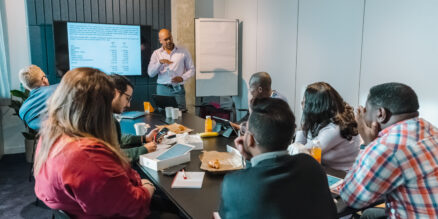Key details
Mode of delivery: Classroom-based
Course code: AFB65B
Duration: 5 days
Fee: £4,605.00 + VAT
CPD Hours: 30
Course Overview
This course develops intermediate and advanced skills in valuation, FX markets, risk metrics, derivatives, and portfolio design — transitioning participants from analysis to strategic implementation.
Agenda
Day – 1 Advanced Equity Valuation Techniques
- Multi-Stage DCF Models
- Relative Valuation: EV/EBITDA, PEG
- Valuation in Cyclical and High-Growth Sectors
Day – 2 Currency Markets and FX Risk
- FX Markets and Participants
- Spot, Forward, and Options Contracts
- FX Risk Hedging
Day – 3 Investment Risk: Identification and Budgeting
- Systematic vs. Unsystematic Risk
- Volatility, Beta, and Value at Risk (VaR)
- Risk Budgeting and Control
Day – 4 Derivatives in Practice
- Futures and Options Pricing Basics
- Swaps and Structured Products
- Real-World Derivatives Misuse
Day – 5 Course Review
- Summary and recap of key learning objectives
- Action Planning
Post-Course
- Three (3) x hour-long Executive Coaching sessions at monthly intervals following Course Completion
Target Audience
This course is suitable for:
- Investment Professionals (Analysts, Associates, Portfolio Managers)
- Finance Managers and Corporate Treasurers
- Capital Markets, Fixed Income, Equity, and Derivatives Professionals
- Financial Regulators and Supervisors
- Risk Analysts and Financial Controllers
- Wealth Managers and Private Bankers
- Fintech Professionals
- Policy Advisors and Economists
- Sustainability and ESG Officers
- Business School and Executive Education Participants
Learning Outcomes
By the end of this course, you will be able to implement a successful strategy that enables you to:
- Build a multi-stage DCF using growth assumptions.
- Evaluate companies using sector-relative metrics.
- Analyse appropriate models for volatile industries.
- Describe how currencies are traded and by whom.
- Differentiate FX instruments and their applications.
- Design basic hedging strategies using forwards or options.
- Classify types of investment risk and their implications.
- Apply common risk metrics to portfolio scenarios.
- Develop a basic risk budgeting plan for asset managers.
- Apply pricing formulas for call and put options.
- Analyse how swaps are used in rate and currency hedging.
- Evaluate case studies of derivatives-related financial crises.










